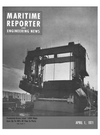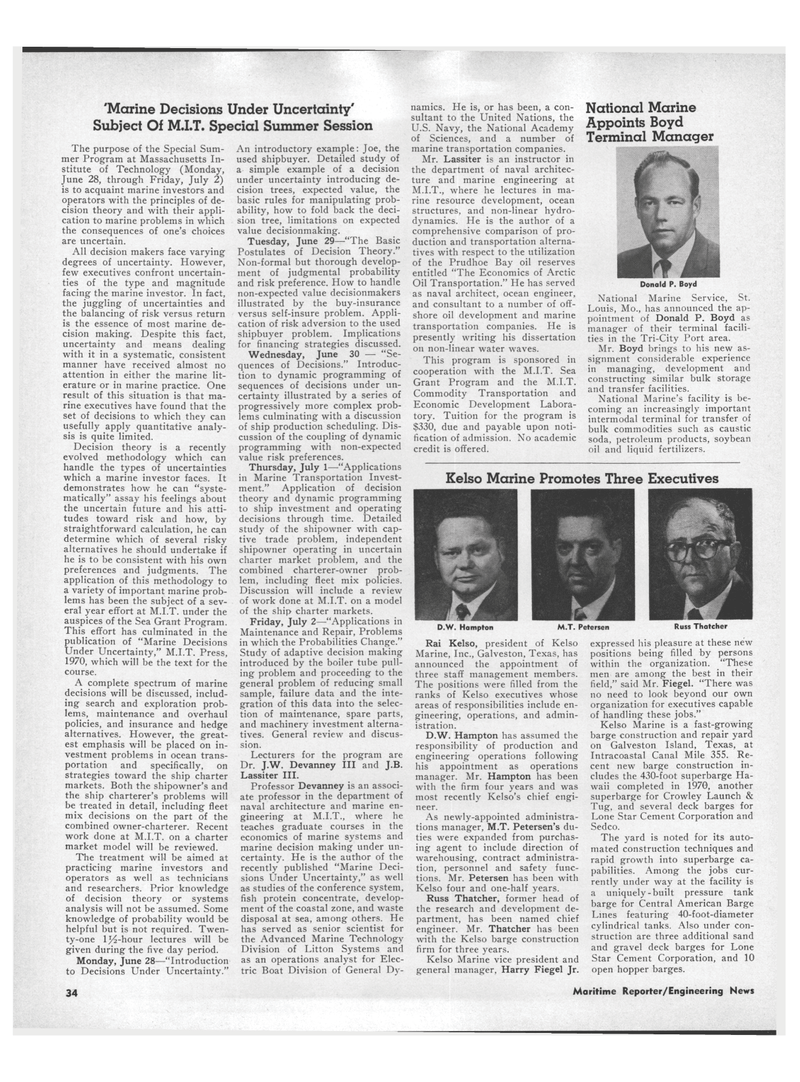
Page 32: of Maritime Reporter Magazine (April 1971)
Read this page in Pdf, Flash or Html5 edition of April 1971 Maritime Reporter Magazine
'Marine Decisions Under Uncertainty'
Subject Of M.I.T. Special Summer Session
The purpose of the Special Sum- mer Program at Massachusetts In- stitute of Technology (Monday,
June 28, through Friday, July 2) is to acquaint marine investors and operators with the principles of de- cision theory and with their appli- cation to marine problems in which the consequences of one's choices are uncertain.
All decision makers face varying degrees of uncertainty. However, few executives confront uncertain- ties of the type and magnitude facing the marine investor. In fact, the juggling of uncertainties and the balancing of risk versus return is the essence of most marine de- cision making. Despite this fact, uncertainty and means dealing with it in a systematic, consistent manner have received almost no attention in either the marine lit- erature or in marine practice. One result of this situation is that ma- rine executives have found that the set of decisions to which they can usefully apply quantitative analy- sis is quite limited.
Decision theory is a recently evolved methodology which can handle the types of uncertainties which a marine investor faces. It demonstrates how he can "syste- matically" assay his feelings about the uncertain future and his atti- tudes toward risk and how, by straightforward calculation, he can determine which of several risky alternatives he should undertake if he is to be consistent with his own preferences and judgments. The application of this methodology to a variety of important marine prob- lems has been the subject of a sev- eral year effort at M.I.T. under the auspices of the Sea Grant Program.
This effort has culminated in the publication of "Marine Decisions
Under Uncertainty," M.I.T. Press, 1970, which will be the text for the course.
A complete spectrum of marine decisions will be discussed, includ- ing search and exploration prob- lems, maintenance and overhaul policies, and insurance and hedge alternatives. However, the great- est emphasis will be placed on in- vestment problems in ocean trans- portation and specifically, on strategies toward the ship charter markets. Both the shipowner's and the ship charterer's problems will be treated in detail, including fleet mix decisions on the part of the combined owner-charterer. Recent work done at M.I.T. on a charter market model will be reviewed.
The treatment will be aimed at practicing marine investors and operators as well as technicians and researchers. Prior knowledge of decision theory or systems analysis will not be assumed. Some knowledge of probability would be helpful but is not required. Twen- ty-one 1 ^2-hour lectures will be given during the five day period.
Monday, June 28—"Introduction to Decisions Under Uncertainty."
An introductory example: Joe, the used shipbuyer. Detailed study of a simple example of a decision under uncertainty introducing de- cision trees, expected value, the basic rules for manipulating prob- ability, how to fold back the deci- sion tree, limitations on expected value decisionmaking.
Tuesday, June 29—"The Basic
Postulates of Decision Theory."
Non-formal but thorough develop- ment of judgmental probability and risk preference. How to handle non-expected value decisionmakers illustrated by the buy-insurance versus self-insure problem. Appli- cation of risk adversion to the used shipbuyer problem. Implications for financing strategies discussed.
Wednesday, June 30 — "Se- quences of Decisions." Introduc- tion to dynamic programming of sequences of decisions under un- certainty illustrated by a series of progressively more complex prob- lems culminating with a discussion of ship production scheduling. Dis- cussion of the coupling of dynamic programming with non-expected value risk preferences.
Thursday, July 1—"Applications in Marine Transportation Invest- ment." Application of decision theory and dynamic programming to ship investment and operating decisions through time. Detailed study of the shipowner with cap- tive trade problem, independent shipowner operating in uncertain charter market problem, and the combined charterer-owner prob- lem, including fleet mix policies.
Discussion will include a review of work done at M.I.T. on a model of the ship charter markets.
Friday, July 2—"Applications in
Maintenance and Repair, Problems in which the Probabilities Change."
Study of adaptive decision making introduced by the boiler tube pull- ing problem and proceeding to the general problem of reducing small sample, failure data and the inte- gration of this data into the selec- tion of maintenance, spare parts, and machinery investment alterna- tives. General review and discus- sion.
Lecturers for the program are
Dr. J.W. Devanney III and J.B.
Lassiter III.
Professor Devanney is an associ- ate professor in the department of naval architecture and marine en- gineering at M.I.T., where he teaches graduate courses in the economics of marine systems and marine decision making under un- certainty. He is the author of the recently published "Marine Deci- sions Under Uncertainty," as well as studies of the conference system, fish protein concentrate, develop- ment of the coastal zone, and waste disposal at sea, among others. He has served as senior scientist for the Advanced Marine Technology
Division of Litton Systems and as an operations analyst for Elec- tric Boat Division of General Dy- namics. He is, or has been, a con- sultant to the United Nations, the
U.S. Navy, the National Academy of Sciences, and a number of marine transportation companies.
Mr. Lassiter is an instructor in the department of naval architec- ture and marine engineering at
M.I.T., where he lectures in ma- rine resource development, ocean structures, and non-linear hydro- dynamics. He is the author of a comprehensive comparison of pro- duction and transportation alterna- tives with respect to the utilization of the Prudhoe Bay oil reserves entitled "The Economics of Arctic
Oil Transportation." He has served as naval architect, ocean engineer, and consultant to a number of off- shore oil development and marine transportation companies. He is presently writing his dissertation on non-linear water waves.
This program is sponsored in cooperation with the M.I.T. Sea
Grant Program and the M.I.T.
Commodity Transportation and
Economic Development Labora- tory. Tuition for the program is $330, due and payable upon noti- fication of admission. No academic credit is offered.
National Marine
Appoints Boyd
Terminal Manager
Donald P. Boyd
National Marine Service, St.
Louis, Mo., has announced the ap- pointment of Donald P. Boyd as manager of their terminal facili- ties in the Tri-City Port area.
Mr. Boyd brings to his new as- signment considerable experience in managing, development and constructing similar bulk storage and transfer facilities.
National Marine's facility is be- coming an increasingly important intermodal terminal for transfer of bulk commodities such as caustic soda, petroleum products, soybean oil and liquid fertilizers.
Kelso Marine Promotes Three Executives
D.W. Hampton M.T. Petersen Russ Thatcher
Rai Kelso, president of Kelso
Marine, Inc., Galveston, Texas, has announced the appointment of three staff management members.
The positions were filled from the ranks of Kelso executives whose areas of responsibilities include en- gineering, operations, and admin- istration.
D.W. Hampton has assumed the responsibility of production and engineering operations following his appointment as operations manager. Mr. Hampton has been with the firm four years and was most recently Kelso's chief engi- neer.
As newly-appointed administra- tions manager, M.T. Petersen's du- ties were expanded from purchas- ing agent to include direction of warehousing, contract administra- tion, personnel and safety func- tions. Mr. Petersen has been with
Kelso four and one-half years.
Russ Thatcher, former head of the research and development de- partment, has been named chief engineer. Mr. Thatcher has been with the Kelso barge construction firm for three years.
Kelso Marine vice president and general manager, Harry Fiegel Jr. expressed his pleasure at these new positions being filled by persons within the organization. "These men are among the best in their field," said Mr. Fiegel. "There was no need to look beyond our own organization for executives capable of handling these jobs."
Kelso Marine is a fast-growing barge construction and repair yard on Galveston Island, Texas, at
Intracoastal Canal Mile 355. Re- cent new barge construction in- cludes the 430-foot superbarge Ha- waii completed in 1970, another superbarge for Crowley Launch &
Tug, and several deck barges for
Lone Star Cement Corporation and
Sedco.
The yard is noted for its auto- mated construction techniques and rapid growth into superbarge ca- pabilities. Among the jobs cur- rently under way at the facility is a uniquely-built pressure tank barge for Central American Barge
Lines featuring 40-foot-diameter cylindrical tanks. Also under con- struction are three additional sand and gravel deck barges for Lone
Star Cement Corporation, and 10 open hopper barges. 34 Maritime Reporter/Engineering News

 31
31

 33
33
